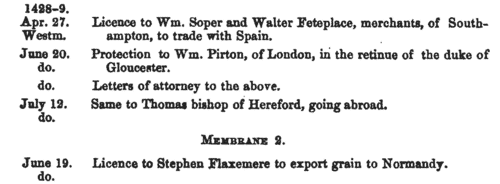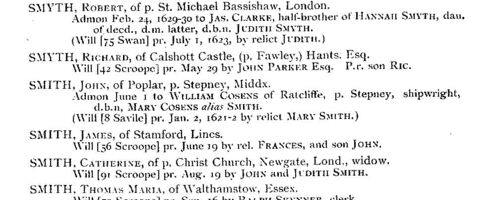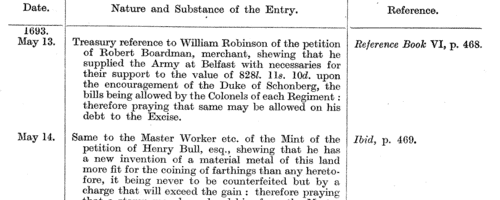Goldstone Surname Ancestry ResultsOur indexes 1000-1999 include entries for the spelling 'goldstone'. In the period you have requested, we have the following 132 records (displaying 1 to 10): Single Surname Subscription | | | Buying all 132 results of this search individually would cost £724.00. But you can have free access to all 132 records for a year, to view, to save and print, for £100. Save £624.00. More... |
These sample scans are from the original record. You will get scans of the full pages or articles where the surname you searched for has been found. Your web browser may prevent the sample windows from opening; in this case please change your browser settings to allow pop-up windows from this site. Freemen and citizens of London
(1314-1337)
Letter Book D, or the Liber Rubeus (Red Book) of the City of London contains enrolments of recognizances between inhabitants, particularly citizens, for sums of money lent or due; grants of pieces of land or property; and various records relating to the city administration, minor infractions, &c. In addition, this volume includes the record of admissions to the freedom of the city by redemption (payment of a sum of money), and the binding and discharge of apprenticeships for the same period. Without freedom of the city - which could only be gained by birth (patrimony), apprenticeship or servitude, or by redemption - no man could open a shop, sell goods retail, or even reside within the city walls (except for a limited time, and then only in the houses of freemen and under frankpledge). The text was edited by Reginald R. Sharpe and printed by order of the Corporation of the City of London in 1902.
GOLDSTONE. Cost: £4.00.  | Sample scan, click to enlarge

| Inhabitants of London
(1337-1352)
Letter Book F of the City of London contains enrolments of recognizances between inhabitants, particularly citizens, for sums of money lent or due; grants of pieces of land or property; and various records relating to the city administration, minor infractions, &c. The book includes an assessment of the inhabitants in 1346 (pages 143 to 149) listing many householders; a list of mayors and sheriffs from 1189 to 1548 (276-303), and records of the city's use of infangthef (summary execution of certain criminals) down to 1409. The text was edited by Reginald R. Sharpe and printed by order of the Corporation of the City of London in 1904.
GOLDSTONE. Cost: £4.00.  | Sample scan, click to enlarge

| The English in France
(1444)
King Henry VI of England (one of the grandsons of Charles VI of France) claimed the throne of France (and quartered the fleurs-de-lis of France with the lions of England on the royal standard) as had his predecessors since Edward III, as descendants of Philip IV of France. The English had real power or influence in Brittany, Normandy, Flanders and Gascony, and actual possession of several coastal garrisons, in particular Calais, where the French inhabitants had been replaced by English. Henry VI came to the throne only seven years after his father had trounced the French at Agincourt; but his cousin, Charles VII, who became king of France in the same year, spent his long reign rebutting the English king's claim to his throne by territorial reconquest and consolidation. The English administration kept a series of records called the French Rolls. On these are recorded royal appointments and commissions in France; letters of protection and safe-conduct to soldiers, merchants, diplomats and pilgrims travelling to France from England and returning, and to foreign legations. There are also licences to merchants to export to the Continent, and to captains to transport pilgrims. As Henry VI's reign progressed, and the English grip on northern France loosened, the French Rolls also increasingly include entries concerning the ransoming of English prisoners.GOLDSTONE. Cost: £6.00.  | Sample scan, click to enlarge

| Official Papers
(1627-1628)
The State Papers Domestic cover all manner of business relating to Britain, Ireland and the colonies, conducted in the office of the Secretary of State as well as other miscellaneous records.
GOLDSTONE. Cost: £4.00.  | Sample scan, click to enlarge

| PCC Probates and Administrations
(1631)
The Prerogative Court of Canterbury's main jurisdiction was central and southern England and Wales, as well as over sailors &c dying abroad: these brief abstracts, compiled under the title "Year Books of Probates", and printed in 1902, usually give address, date of probate and name of executor or administrator. They are based on the Probate Act Books, cross-checked with the original wills, from which additional details are, occasionally, added. The original spelling of surnames was retained, but christian and place names have been modernised where necessary.GOLDSTONE. Cost: £2.00.  | Sample scan, click to enlarge

| St Albans Archdeaconry Marriage Licences: Sureties
(1637)
Southern Hertfordshire lay in the archdeaconry of St Albans. Marriage licences registered in the archdeaconry act books from 1584 to 1639, and surviving bonds and allegations from 1611 to 1620, 1625 to 1627, 1633 to 1637 and 1661 to 1668 were abstracted by A. E. Gibbs and printed in volume 1 of the Herts Genealogist and Antiquary published in 1895. Both the act books and the bonds normally give full name and parish of bride and groom, and state whether the bride was maiden or widow. A widow's previous married surname is given, not her maiden surname. Occasionally (doubtless when a party was under age) a father's name is given. The later act books sometimes stated at what church the wedding was intended to be celebrated. The marriage bonds give the name of the bondsman or surety. The surety's surname is often the same as the bride or groom, and doubtless in most cases the bondsman was a father or close relative; but a few innkeepers and other tradesmen of St Albans also undertook this duty.GOLDSTONE. Cost: £4.00.  | Sample scan, click to enlarge

| London Merchants (1677)
The oldest printed list of the merchants and bankers of London, reprinted in 1878 from the exceedingly rare original. 'A Collection of the Names of the Merchants Living in and about The City of London; Very Usefull and Necessary. Carefully Collected for the Benefit of all Dealers that shall gave occasion with any of them; Directing them at the first sight of their name, to the place of their abode.'
GOLDSTONE. Cost: £8.00.  | Sample scan, click to enlarge

| Treasury Books
(1693-1696)
Records of the Treasury administration in Britain, America and the colonies, from January 1693 to March 1696. These also include records of the appointment and replacement of customs officers such as tide waiters and surveyors. The calendar was prepared by William A. Shaw for the Lords Commissioners of His Majesty's Treasury and published in 1935, from letters patent, privy seals, royal sign manuals and warrants, treasury warrants, commissions, orders, letters, memorials, reports and other entries, all not of the nature of Treasury Minutes. GOLDSTONE. Cost: £4.00.  | Sample scan, click to enlarge

|  Masters and Apprentices
(1720) Masters and Apprentices
(1720)
Apprenticeship indentures and clerks' articles were subject to a 6d or 12d per pound stamp duty: the registers of the payments usually give the master's trade, address, and occupation, and the apprentice's father's name and address, as well as details of the date and length of the apprenticeship. 1 January to 3 September 1720.GOLDSTONE. Cost: £8.00.  | Sample scan, click to enlarge

|  Masters and Apprentices
(1732) Masters and Apprentices
(1732)
Apprenticeship indentures and clerks' articles were subject to a 6d or 12d per pound stamp duty: the registers of the payments usually give the master's trade, address, and occupation, and the apprentice's father's name and address, as well as details of the date and length of the apprenticeship. 3 January to 30 December 1732GOLDSTONE. Cost: £8.00.  | Sample scan, click to enlarge

|
Research your ancestry, family history, genealogy and one-name study by direct access to original records and archives indexed by surname.
|













